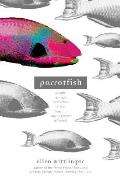An Update to Parrotfish for This Historical Moment
Ellen Wittlinger’s article in The Horn Book about updating her novel Parrotfish (published in 2007) is testimony to changes in society and in language.
Wittlinger’s novel is considered the first modern young adult novel with a transgender protagonist. In writing it, she consulted with Toby, a twentysomething friend of one of her children who was female-to-male transgender. That was only ten years ago, but the first edition’s language was already out of date.
Wittlinger writes:
She also expects further change in this area of language. When GLAAD issued the ninth edition of its Media Reference Guide in 2014, it stated it had been publishing that reference for “over 15 years.” At 66 pages, with a lot of white space in the design, it’s not a hefty text. Nonetheless, at the pace it’s been revised so far, that ninth edition will need replacement in 2016.
Given how sensitive we are these days about language and other signifiers, I wonder how soon there may be complaints about print copies of Parrotfish being not just of its historical moment, but insensitive. It took only three days after Wittlinger’s essay appeared for a pseudonymous commenter to take issue with its spelling of “cis-gender”—a very new word that’s appeared in three different forms (“cisgender,” “cis-gender,” and “cis gender”) in news stories this month.
Wittlinger’s novel is considered the first modern young adult novel with a transgender protagonist. In writing it, she consulted with Toby, a twentysomething friend of one of her children who was female-to-male transgender. That was only ten years ago, but the first edition’s language was already out of date.
Wittlinger writes:
In the ALAN Review interview, and often in the original edition of the book, I used the word transgendered. This usage is no longer correct. If you say, for example, that paper has “yellowed,” something has happened to the paper to make it yellow. But “yellow paper” has always been yellow, just as transgender people have always been who they are — nothing has acted upon them to make them transgender. As the GLAAD Reference Guide points out, “You would not say that Elton John is ‘gayed’ or Ellen DeGeneres is ‘lesbianed,’ therefore you would not say Chaz Bono is ‘transgendered.’” Scratch the “-ed” ending.In this age of digital publishing, it’s relatively easy to make such changes in electronic books and new printings. The existing paper copies of Parrotfish will, of course, remain the same. Wittlinger also states that 2007 remains the novel’s “historical moment” even with the terminology changes.
But the word that bothered me — and critics — most was tranny. A decade ago, Toby felt it was a word that transgender people would use amongst themselves or to refer to themselves, and that’s how I used it in the book. But the word has evolved to be defamatory. GLAAD’s entry says, “Please note that while some transgender people may use ‘tranny’ to describe themselves, others find it profoundly offensive.”
She also expects further change in this area of language. When GLAAD issued the ninth edition of its Media Reference Guide in 2014, it stated it had been publishing that reference for “over 15 years.” At 66 pages, with a lot of white space in the design, it’s not a hefty text. Nonetheless, at the pace it’s been revised so far, that ninth edition will need replacement in 2016.
Given how sensitive we are these days about language and other signifiers, I wonder how soon there may be complaints about print copies of Parrotfish being not just of its historical moment, but insensitive. It took only three days after Wittlinger’s essay appeared for a pseudonymous commenter to take issue with its spelling of “cis-gender”—a very new word that’s appeared in three different forms (“cisgender,” “cis-gender,” and “cis gender”) in news stories this month.



No comments:
Post a Comment